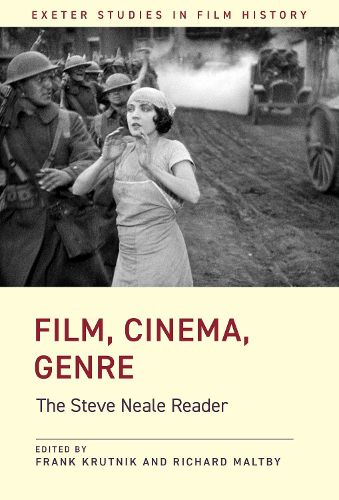Readings Newsletter
Become a Readings Member to make your shopping experience even easier.
Sign in or sign up for free!
You’re not far away from qualifying for FREE standard shipping within Australia
You’ve qualified for FREE standard shipping within Australia
The cart is loading…






This title is printed to order. This book may have been self-published. If so, we cannot guarantee the quality of the content. In the main most books will have gone through the editing process however some may not. We therefore suggest that you be aware of this before ordering this book. If in doubt check either the author or publisher’s details as we are unable to accept any returns unless they are faulty. Please contact us if you have any questions.
This book brings together key works by pioneering film studies scholar Steve Neale. From the 1970s to the 2010s Neale’s vital and unparalleled contribution to the subject has shaped many of the critical agendas that helped to confirm film studies’ position as an innovative discipline within the humanities.
Although known primarily for his work on genre, Neale has written on a far wider range of topics. In addition to selections from the influential volumes Genre (1980) and Genre and Hollywood (2000), and articles scrutinizing individual genres - the melodrama, the war film, science fiction and film noir -
this Reader provides critical examinations of cinema and technology, art cinema, gender and cinema, stereotypes and representation, cinema history, the film industry, New Hollywood, and film analysis. Many of the articles included are recommended reading for a range of university courses worldwide, making the volume useful to students at undergraduate level and above, researchers, and teachers of film studies, media studies, gender studies and cultural studies.
The collection has been selected and edited by Frank Krutnik and Richard Maltby, scholars who have worked closely with Neale and been inspired by his diverse and often provocative critical innovations. Their introduction assesses the significance of Neale’s work, and contextualizes it within the development of UK film studies.
$9.00 standard shipping within Australia
FREE standard shipping within Australia for orders over $100.00
Express & International shipping calculated at checkout
This title is printed to order. This book may have been self-published. If so, we cannot guarantee the quality of the content. In the main most books will have gone through the editing process however some may not. We therefore suggest that you be aware of this before ordering this book. If in doubt check either the author or publisher’s details as we are unable to accept any returns unless they are faulty. Please contact us if you have any questions.
This book brings together key works by pioneering film studies scholar Steve Neale. From the 1970s to the 2010s Neale’s vital and unparalleled contribution to the subject has shaped many of the critical agendas that helped to confirm film studies’ position as an innovative discipline within the humanities.
Although known primarily for his work on genre, Neale has written on a far wider range of topics. In addition to selections from the influential volumes Genre (1980) and Genre and Hollywood (2000), and articles scrutinizing individual genres - the melodrama, the war film, science fiction and film noir -
this Reader provides critical examinations of cinema and technology, art cinema, gender and cinema, stereotypes and representation, cinema history, the film industry, New Hollywood, and film analysis. Many of the articles included are recommended reading for a range of university courses worldwide, making the volume useful to students at undergraduate level and above, researchers, and teachers of film studies, media studies, gender studies and cultural studies.
The collection has been selected and edited by Frank Krutnik and Richard Maltby, scholars who have worked closely with Neale and been inspired by his diverse and often provocative critical innovations. Their introduction assesses the significance of Neale’s work, and contextualizes it within the development of UK film studies.